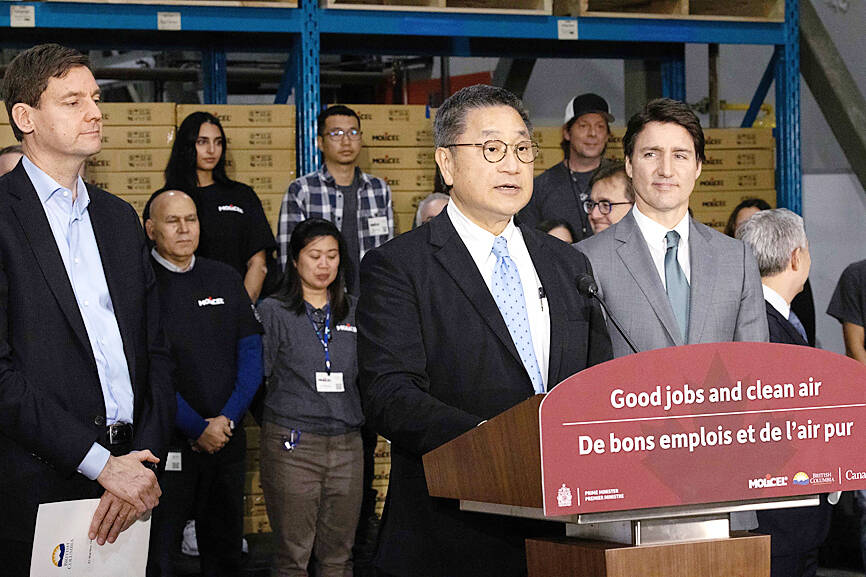Taiwan Cement Corp (TCC, 台灣水泥) yesterday announced that its subsidiary E-One Moli Quantum Energy (Canada) Ltd would establish a battery cell plant in the Vancouver suburb of Maple Ridge, with one-fifth of the funding to be provided by the Canadian government.
E-One Moli plans to start construction of the plant next year, Taiwan Cement said in a statement on its Web site.
The plant, which is to have 2.8 gigawatt-hours of battery capacity, is expected to become fully operational in 2028, producing up to 135 million lithium-ion batteries per year, it said.

Photo courtesy of Taiwan Cement Corp
Taiwan Cement plans an initial investment of NT$25.5 billion (US$794.19 million) in the facility, with a subsidy of NT$4.8 billion from the Canadian government’s Strategic Innovation Fund, the statement said.
TCC Group (台泥集團) is to raise NT$10 billion to finance the investment, with the rest from bank loans and support from strategic investors, the statement said.
The project would be the largest high-performance lithium-ion battery cell investment in Canada, it said.
With British Columbia-based electric utility BC Hydro to build a special transmission and distribution network for E-One Moli to use hydroelectric power in the province, the new plant would become the world’s first battery cell factory that “uses 100 percent green electricity,” it said.
E-One Moli’s announcement came as Canadian Prime Minister Justin Trudeau, accompanied by British Columbia Minister of Jobs, Economic Development and Innovation Brenda Bailey and British Columbia Premier David Eby, visited the subsidiary’s production base in Vancouver on Tuesday.
Trudeau said that British Columbia has long been known for innovation in the clean technology space, and securing the major clean battery project in Maple Ridge would build on that expertise to create jobs and fight climate change.
“When we support projects like E-One Moli’s new facility in Maple Ridge, we bolster Canada’s role as a global clean tech leader, we create good jobs and we help keep our air clean,” the statement quoted Trudeau as saying.
The investment is expected to create 450 jobs, making E-One Moli one of the largest private-sector employers in the region, the firm said.
TCC Group chairman Nelson Chang (張安平) and E-One Moli Energy Corp (能元科技) president Casey Shiue (薛人禎) were at the site to welcome Trudeau and other Canadian officials.
E-One Moli is committed to innovation, creativity and social values, Chang said.
“We believe that carbon dioxide reduction is key to the success of all businesses in the future,” the statement quoted him as saying.

Power supply and electronic components maker Delta Electronics Inc (台達電) yesterday said second-quarter revenue is expected to surpass the first quarter, which rose 30 percent year-on-year to NT$118.92 billion (US$3.71 billion). Revenue this quarter is likely to grow, as US clients have front-loaded orders ahead of US President Donald Trump’s planned tariffs on Taiwanese goods, Delta chairman Ping Cheng (鄭平) said at an earnings conference in Taipei, referring to the 90-day pause in tariff implementation Trump announced on April 9. While situations in the third and fourth quarters remain unclear, “We will not halt our long-term deployments and do not plan to

‘SHORT TERM’: The local currency would likely remain strong in the near term, driven by anticipated US trade pressure, capital inflows and expectations of a US Fed rate cut The US dollar is expected to fall below NT$30 in the near term, as traders anticipate increased pressure from Washington for Taiwan to allow the New Taiwan dollar to appreciate, Cathay United Bank (國泰世華銀行) chief economist Lin Chi-chao (林啟超) said. Following a sharp drop in the greenback against the NT dollar on Friday, Lin told the Central News Agency that the local currency is likely to remain strong in the short term, driven in part by market psychology surrounding anticipated US policy pressure. On Friday, the US dollar fell NT$0.953, or 3.07 percent, closing at NT$31.064 — its lowest level since Jan.

The US dollar was trading at NT$29.7 at 10am today on the Taipei Foreign Exchange, as the New Taiwan dollar gained NT$1.364 from the previous close last week. The NT dollar continued to rise today, after surging 3.07 percent on Friday. After opening at NT$30.91, the NT dollar gained more than NT$1 in just 15 minutes, briefly passing the NT$30 mark. Before the US Department of the Treasury's semi-annual currency report came out, expectations that the NT dollar would keep rising were already building. The NT dollar on Friday closed at NT$31.064, up by NT$0.953 — a 3.07 percent single-day gain. Today,

The New Taiwan dollar and Taiwanese stocks surged on signs that trade tensions between the world’s top two economies might start easing and as US tech earnings boosted the outlook of the nation’s semiconductor exports. The NT dollar strengthened as much as 3.8 percent versus the US dollar to 30.815, the biggest intraday gain since January 2011, closing at NT$31.064. The benchmark TAIEX jumped 2.73 percent to outperform the region’s equity gauges. Outlook for global trade improved after China said it is assessing possible trade talks with the US, providing a boost for the nation’s currency and shares. As the NT dollar